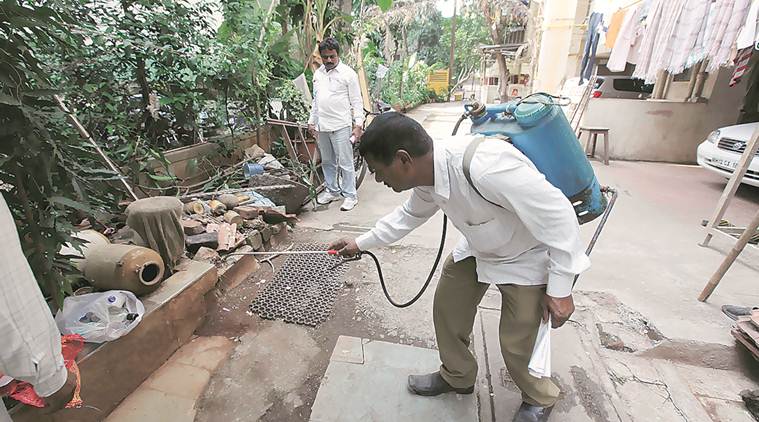Stay updated with the latest - Click here to follow us on Instagram
‘Efforts of administration can’t succeed if there is no community participation in preventing vector-borne diseases’
Administration has come with the fight the bite app, which should be utilised by the residents of Chandigarh for control of vector-borne diseases.
 The administration should also act promptly regarding all the complaints lodged by the community members within 24 to 48 hours.
The administration should also act promptly regarding all the complaints lodged by the community members within 24 to 48 hours.
Chandigarh has started seeing cases of vector-borne diseases like dengue and malaria. Dr P V M Lakshmi, Professor of Epidemiology, School of Public Health, PGI, talks to Chandigarh Newsline about precautions one needs to take and how important the role of society is in preventing the cases of dengue
Dengue and malaria cases have started arriving. What precautions are required, because we expect more number of cases in coming months?
The public should see that there should not be any waterlogging inside or around their premises. The water coolers should be emptied and dried. The containers below the flowerpots and empty flowerpots should be emptied. If there is any waterlogging in their area, they should bring it to the notice of Chandigarh Administration. The picture of the area can be taken and uploaded on the ‘fight the bite’ app of Chandigarh National Vector Borne Disease Control Programme.
Administration plays an important role in tackling the situation. Do you think adequate steps are being taken by the department to prevent vector-borne diseases?
Although administration plays an important role, the efforts of administration can’t succeed if there is no community participation. Administration has come with the fight the bite app, which should be utilised by the residents of Chandigarh for control of vector-borne diseases. In addition, they have breeding checkers for house-to-house visits. Community should co-operate with them when they come for visits, though it might cause a bit of inconvenience. Small discomfort can lead to better comfort by preventing dengue. The administration is trying to control this menace and they are trying their best and we as the community should cooperate to make their efforts fruitful.
 Dr P V M Lakshmi.
Dr P V M Lakshmi.How can we prevent dengue cases in Chandigarh, which has over 10 lakh population, less then neighbouring states?
Prompt reporting of cases (both suspected and confirmed) from all the healthcare providers coupled with ongoing surveillance for identification of hot spots and environmental measures to control breeding sites with active community participation will help in preventing dengue cases in Chandigarh. In this regard, community has to come forward in a big way and resident welfare associations need to play a big role. They should conduct regular meetings in their area to make people aware of how dengue spreads and what the breeding sites of mosquito are and how they can be removed. They may develop a team of few community volunteers who might be allocated houses where they may go for regular visits every week for checking of breeding sites inside the house. If every mohalla pledges that they will make their area mosquito-free then tackling this infection is not a problem.
The administration should also act promptly regarding all the complaints lodged by the community members within 24 to 48 hours and this will build faith of the community in the administration and their active collaboration can be built up and the vector-borne diseases can be successfully controlled. This will also help in redirecting the manpower to the areas where community participation and awareness levels are low. The youth studying in colleges and the children in schools should be mobilised for checking the breeding sites in their homes and hostels to prevent dengue breeding sites. All government and private offices should dedicate one hour per week with their entire staff taking part in checking and removing breeding sites in their offices. These activities can be documented and best RWA, office and school can be awarded by the administration in recognition of their efforts in mosquito control.
Health department says migratory population is a problem because many times they become source of inspection after they travel from different states. What needs to be done to deal with a such problem? We have seen cases coming from outside states. Also, PGI has been served notice for mosquitogenic conditions recently. What steps are being taken to keep the premises clean, especially hostels?
Although migratory population is a problem, if there are no breeding sites, the infection cannot spread further and will die its natural death. This issue (PGI) is not in my purview. Medical Superintendent’s office, which looks after sanitation department, can better answer.
Do you think school children can play a role in creating awareness?
Children should be educated regarding control of breeding sites of mosquitoes so that when they go back home, they spread this knowledge to their parents and also check their own houses for mosquito breeding. Weekly or fortnightly 15-minute awareness during school assembly will help in educating the children. There can be competitions (painting, elocution, skits) at school and inter-school level on prevention of dengue. For safety wise, education department should issue orders to the principals and directors of all the schools to have regular checks on their premises for mosquito breeding.
Health department says by 2020, they want to eliminate malaria. Do you think they can achieve this target?
Nothing is impossible if one has the will to do it. There are countries like Sri Lanka, which have achieved this. We can learn lessons from across the world and can successfully achieve this goal. Notification of all malaria cases, followed by prompt case investigation, complete treatment as per guidelines and integrated management of vectors will help in eliminating malaria.
Challan against violators in city is only Rs 500. Is it enough?
The first-time violators can be given simple notice and further violations should be challaned with progressively increasing amounts of challan to deter. Mentioning the list of repeated violators (three or more times offenders) on website and newspaper might also help as everyone cares about their public image.







